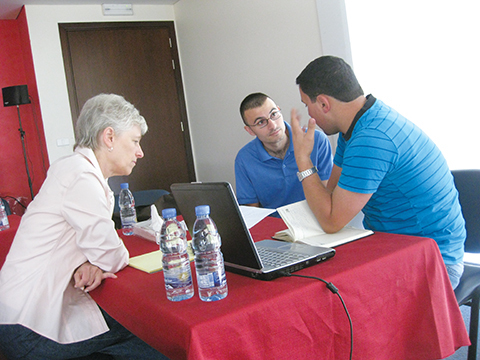Ramping Up the Compassion Factor

Recently, someone asked, "How are the Nazarenes doing in the Middle East?" The answer varies from country to country. Nazarenes in Baghdad face the dangers of explosions in the market. Egyptians live in uncertainty with a drastically weakened economy and a newly-elected government. Syrians are exhausted from civil war and ministering to hundreds of displaced families. Jordanians are coping with thousands of refugees, and people in Israel and the West Bank continue on with occupation and violence.
Media tools keep us updated on the unfolding events, but real people, Nazarenes and their neighbors, are living under this canopy of hurt and threat and strive for normalcy as best they can while the world rages in their own backyards.
Twenty Nazarenes just finished the second of a three-part training program in lay counseling in Beirut, Lebanon. The purpose is to equip parishioners, who have skills in attentive listening, to be effective in bringing healing and empowerment to people in distress. Next year, a number of the participants will graduate as trainers so that the program will multiply over time.
Three years before the lay counseling program started, Marlene Mashantaf was wondering where she could get training in counseling. Marlene lived through the Lebanese civil war of the 70s and 80s in which she and her neighbors lost family members to the conflict and were themselves traumatized by living in crowded bomb shelters.
Once, the fighting in their neighborhood turned so intense that for an entire month 2,000 people shared a single bathroom in the shelter.
If you can get Marlene to tell her story, it is short with very few details, and you know she is protecting herself from the memories that still sting even after decades have passed.
Marlene is the principal at the Beirut Nazarene School, which serves 170 children of low-income families in grades K-9. An increasing part of her role at the school is spending time with the mothers of her students. She listens to them as they share their stress, which has roots in the past and nourishment in the present. Marlene always wanted training in counseling that would enable her to help parents and students. "I started asking God where I could get training in counseling so I could help others, and out of the circumstances happening to us three years ago we got the opportunity to have a lay counseling program. Now I can see that God is answering my prayers!"
The circumstance to which Marlene referred was the death of her pastor, Raja Nwaisser. At the age of 40, he suffered a heart attack while he was baptizing new believers in Beirut. Nazarene Compassionate Ministries sponsored a grief seminar led by Rand and Phyllis Michael, university educators from Portland, Oregon, with the help of Tom and Karen Gray, missionaries in the Middle East. The seminar helped Raja's wife and the church grieve in healthy ways.
Rand and Phyllis shared with us about the concept of lay counseling and how they were experiencing success with students in Asia, Africa, and Eastern Europe. We started thinking of Nazarenes in the Middle East who at the time were facing their own crises:
- Teachers in the Damascus church were asking for advice on how to attend to the emotional needs of adolescent Iraqi refugees in an after-school program, whose behaviors were reflecting the trauma of war.
- Israelis and Palestinians were at their peak of tension after the bombardment of Gaza in retaliation for mortars fired by a militant wing of the Hamas.
- Jordanians were exhausted and stressed from relief work for the thousands of Iraqi refugees who were living in their neighborhoods (not to mention the stress and uncertainty of the Iraqis who were now homeless and vulnerable).
As they sipped hot tea together following the grief seminar, someone spoke for the group by saying, "We wish we could have more training in counseling so that we can help our neighbors and friends who are going through difficult times." Rand and Phyllis set their tea cups on the table and replied, "We can help with that."
By the late summer of 2011, the Michaels and the Grays started teaching 20 students from Lebanon, Jordan, and Egypt in basic counseling skills. The second phase of the training finished in the summer of 2012, and part three is scheduled for July of 2013. "The really exciting part is that we have identified seven students we feel will be good trainers so that this ministry can expand in the churches," says Rand.
A stipulation of the course is that participants must practice their newly-acquired skills throughout the year. Some hang out with their college friends, some lead small discipleship groups, and one young man, Mukhlous Halasa, taught the concepts he learned in year one to people in his college fellowship group at his church. "My aim is that in Jordan we will go to the churches and train others," explains Halasa. "The students were amazed when we began to compare our culture with values in the kingdom of God. We then began to practice listening to each other and we found that it was really helping us to experience peace."
This year the students have expressed interest in visiting the refugee camps set up in Lebanon and Jordan for hundreds of thousands of Syrians fleeing from civil war. Nazarenes are delivering food, medicine, and cooking aids, and the lay counseling students want to train the Nazarenes who take part to understand the healing power of listening with love and care.
Because someone asked, this is a glimpse into what Nazarenes are doing in the Middle East.
Rod Green is Nazarene Compassionate Ministries coordinator for the Eastern Mediterranean (Middle East) Field.
Holiness Today, 2012
Please note: This article was originally published in 2012. All facts, figures, and titles were accurate to the best of our knowledge at that time but may have since changed.




